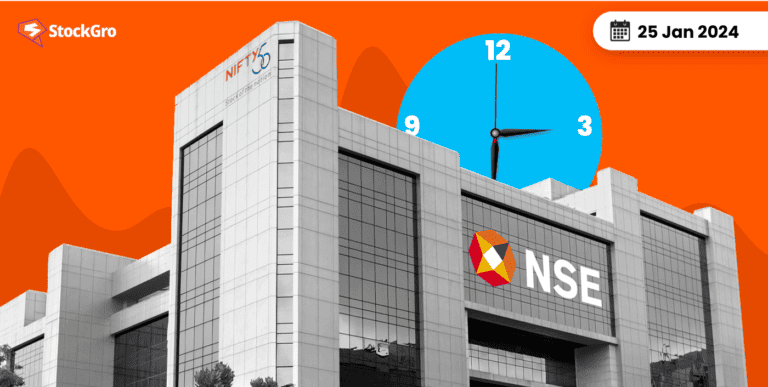Table of contents
The stock market involves multiple players of different capacities and calibres. Each participant handles a significant role in the successful completion of stock market transactions. One of those players who are essential in bridging the gap between exchanges and investors is stock brokers.
From open outcries during the 1800s to various digital and advanced methodologies today, the role of brokers has grown to a large extent. Today’s blog takes you through the types and functions of stock brokers in India.
Who is a stockbroker?
Companies that intend to raise funds from the public must list themselves on stock exchanges. Stock exchanges have thousands of companies on their list for investors to choose from. But, here is a catch – investors cannot interact directly with stock exchanges to buy and sell shares.
Trading on the exchange requires special memberships, which are generally unavailable to individual traders. That is where the role of stockbrokers becomes essential.
Stockbrokers or stock market brokers act as middlemen who bridge the gap between stock exchanges and investors. These stockbrokers obtain permissions and licenses to trade on the exchange, using which they trade on the investor’s behalf.
Types of stockbrokers
- Full-service brokers – These are traditional brokers offering various kinds of investment services to clients. From providing demat and trading accounts to investment advisory and wealth management, their services encompass a variety of financial aspects. Such traditional brokers are generally expensive and charge higher rates of commission, given their expertise and a wide platter of services.
Example of full-service brokers – ICICI Direct, Kotak Securities, etc.
- Discount brokers – As the term suggests, these brokers offer services at discounted rates to clients. They primarily use online platforms to provide fundamental services, such as giving access to trading platforms, mutual funds, etc.
Examples of discount brokers – Zerodha, Upstox, Groww, etc.
Functions of stockbrokers
- The primary function of stockbrokers is to provide access for investors to buy and sell shares. Brokers register themselves with stock exchanges, thereby enabling investors to trade in all stocks listed on that particular exchange.
- Besides stock exchanges, stock brokers manage the role of depository participants. They register with the two Indian depositories – National Securities Depository Limited (NSDL) and Central Depository Services Limited (CDSL), to provide demat accounts to investors. Demat accounts are essential for the safekeeping of securities in electronic forms.
- Stockbroking firms have specialised managers who handle client portfolios. These brokers are equipped with sufficient skills and knowledge of the market scenario to provide guidance and investment advisory services to clients.
- Bulge bracket investment banks provide stockbroking services to customers, along with other specialised services like assisting with mergers and acquisitions, IPO issues, corporate actions like rights issues and bonus issues, etc.
- Brokers conduct market research and publish reports relevant to the public at large. These reports come in handy when investors try to analyse the market for making investment decisions.
- Another significant function of stockbrokers is to report their activities to the stock exchanges and the market regulator – SEBI (Securities and Exchange Board of India). Reporting is essential to provide transparency to investors and ensure their interests are protected.
- Brokers provide margin trading facilities to clients, facilitating them to take larger trading positions. Margin, in this context, refers to providing loans for trading. Clients are required to deposit a certain amount with brokers, based on which they provide loans. Clients enter into high-value trades using these margin amounts, thereby making higher profits.
How to become a stockbroker in India?
An individual must not fall under any category restricted by the stock market regulator, SEBI, to be a stockbroker in India.
Additionally, the qualification of stockbrokers must meet the following criteria:
- Be above 21 years of age
- Should be an Indian citizen
- Must have completed education until Higher Secondary Certificate or equivalent level
- At least two years of working experience with an existing member of SEBI
Upon meeting the above requirements, individuals can fill out the necessary forms and register themselves with stock exchanges to be brokers. The application form goes through various levels of checks until they are granted a license to act as stockbrokers.
Bottomline
Working as a stockbroker comes with a lot of responsibility as it deals with investor’s money. Understanding their role helps brokers perform their duties to provide the best investment opportunities and services to clients. From an investor’s perspective, understanding the role of stockbrokers is essential to entering the stock market, as they are the primary point of contact for all stock market transactions.
FAQs
As of February 2023, more than 5,000 brokers were registered with SEBI. This covers brokers dealing with various securities like stocks, bonds, commodities, etc.
The Securities and Exchange Board of India (SEBI) under the administration of the Ministry of Finance regulates all entities and activities related to securities, including stockbrokers.
Yes, you can lodge a complaint against your broker if you notice unfair practices. SEBI has an investor’s complaints cell that focuses entirely on resolving investor complaints. Additionally, investors can also dial the helpline number 1800 266 7575.
Considering the money involved, stockbroking is a good career, as it pays better than regular jobs. Brokers also get commissions on transactions, increasing their total income. However, the job is stressful as it requires brokers to constantly monitor the market and analyse it accurately.
Investor’s money is generally safe with a broker registered under SEBI. So, it is essential for investors to ensure that the broker’s registration with SEBI is authentic. Apart from the complaint cell, stock exchanges maintain Investor Protection Funds (IPF) to compensate investors when brokers default.
